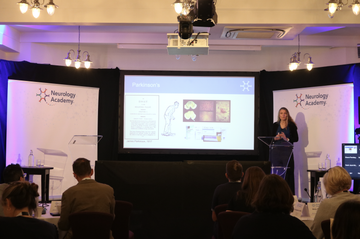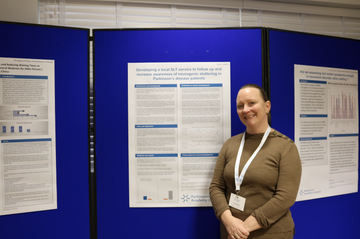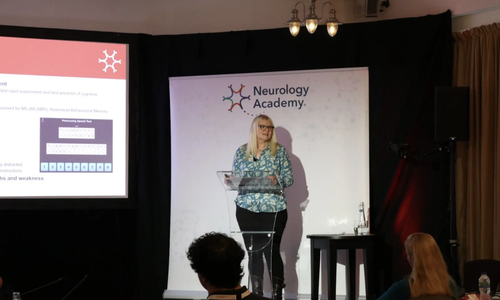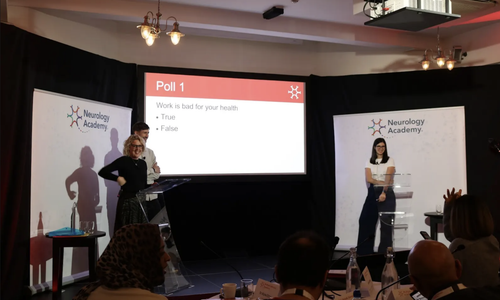Celebrating AHPs, collaboration and integrated care on National Allied Health Professions Day 2025
News
Each year, World AHP Day offers a moment to unite, reflect and celebrate the indispensable contributions of allied health professionals (AHPs). As the third-largest clinical workforce within health and care, AHPs are essential to realising the ambitions of the NHS Long Term Plan – especially in neurology and long-term neurological conditions.
Across all of our Academies, we’re proud to work closely with AHPs, spanning disease areas, roles, geography, and service settings to deliver education, leadership and integrated models of care.
AHP Day 2025: three shifts, one vision
The 2025 AHP Day theme mirrors the transformational ambitions of the NHS:
Hospital → community
Treatment → prevention
Analogue → digital
These three “shifts” also underpin our approach to neurological care and form a central part of the conversation at our upcoming National Neurology Transformation Meeting 2026, where we will explore how to embed these transitions in neurology services.
A multi-dimensional partnership
Our education portfolio spans the full landscape of neurology, and AHPs are central to each strand:
MND Academy – Our dedicated Academy for motor neurone disease offers live webinars and a rich archive of on-demand webinars such as “Speech and communication difficulties in MND – a multidisciplinary approach”, “Symptom management in motor neurone disease”, and “What is MND, latest updates and research”.
On-demand webinars – We maintain a broad catalogue of webinars across conditions, accessible anytime.
- AHP Competency Framework for Neurology – This framework (for therapists, dietitians, SLTs, etc.) was co-developed to support role development, workforce planning, and career progression in neurology settings.
These resources are explicitly relevant for AHPs working in physio, OT, speech & language therapy, dietetics, neuropsychology, rehabilitation and more.

Roles & representation: from speakers to delegates
We don’t just invite AHPs to attend – we ensure they lead, speak and shape our programmes. In our face-to-face MasterClasses, webinars and online modules:
AHPs are included as faculty members and speakers, contributing their clinical insight and lived expertise.
AHPs form a significant part of the delegate base, learning alongside consultants, nurses, researchers and service leads.
Many sessions are co-designed by interdisciplinary teams to reflect real-world neurology practice.
“As an AHP, you work across boundaries – confident in your expertise yet learning alongside others. The Neurology Academy creates that rare space of mutual respect and shared growth.”
Jody Barber, MS health care practitioner & specialist neurological physiotherapist
Geography & service types: national, regional, local
Neurology Academy programmes cross boundaries:
We collaborate with regional networks, trusts, community services and third-sector organisations.
Delegates and faculty come from urban and rural settings, specialist centres, local hospitals and community neurology teams.
This geographic diversity encourages cross-fertilisation of ideas: innovations in one region can be adopted elsewhere.
Integrated & collaborative working
We use our educational platform to:
Highlight local service achievements, illustrating how multidisciplinary teams transform patient care.
Showcase collaborative projects involving AHPs, neurology, nursing and other services (e.g. redesign, audits, joint pathways).
Offer a career showcase for students or professionals considering an allied health route in neurology.

Supporting the three shifts through education & innovation
1. Hospital → community
Many neurological conditions require sustained care in outpatient or community settings. Our training includes models of community neurology, tele-rehabilitation, home-based assessment, and outpatient service redesign – ensuring that AHPs in non-hospital settings have access to specialist neurology education.
2. Treatment → prevention
We emphasise secondary prevention, early rehabilitation, risk mitigation, and lifestyle-based interventions. AHPs are often the ones delivering preventive care (falls prevention, mobility, cognition, nutrition), so our programmes include neurology-specific preventive strategies.
3. Analogue → digital
We are committed to the digital transformation of neurology learning and care:
All webinars are hosted live and then available on demand via the Neurology Academy website.
We plan to expand into digital modules, AI tools, virtual rehab, remote monitoring, and telehealth applications at the National Neurology Transformation Meeting 2026.
AHPs who embrace digital tools will be pivotal in delivering remote therapy, speech support, and monitoring in neurology services.
Navigating emerging challenges: assisted dying & complex conversations
We recognise that the evolving legal and ethical landscape, such as proposals like the Terminally Ill Adult Bill (Assisted Dying), poses significant challenges for clinicians. AHPs, especially in palliative neurology or community settings, may find themselves involved in emotionally fraught conversations. Neurology Academy is committed to developing resources, workshops, and guidance to support clinicians through these complex areas. Find out more about our new online course: ‘Assisted dying: supporting clinicians through complex conversations’
Useful links & resources
Here are key resources you may want to reference or share:
Neurology Academy all upcoming courses: neurologyacademy.org/events
- Neurology Academy on-demand webinars: neurologyacademy.org/on-demand-webinars
MND Academy (webinars, archive, resources): neurologyacademy.org/mnd-academy
AHP Competency Framework for Neurology: neurologyacademy.org/articles/ahp-competency-framework-for-neurology
MND Association webinars & educational events: mndassociation.org/professionals/education/webinars
MND Association calendar of events: mndassociation.org/professionals/education-events
In summary
On Allied Health Professional Day 2025, we honour AHPs as central to neurology care, and we reaffirm Neurology Academy’s commitment to walking side by side with you. Through collaborative education, cross-setting engagement, digital innovation and ethical support, we aim to empower AHPs to lead, transform and deliver excellence in neurological care. We invite all AHPs – current, aspiring, and future – to engage with us, share your voice and help shape neurology services of tomorrow.
Related articles
Uniquely practical education, producing specialist clinical leaders transforming local healthcare
Neurology Academy is an innovative educational provider for healthcare professionals including consultants, specialist nurses, pharmacists, therapists and other allied health professionals. Our courses are developed by practicing specialists who combine their experience and expertise into case-based learning designed to create specialists in their field with confidence in effecting change.




